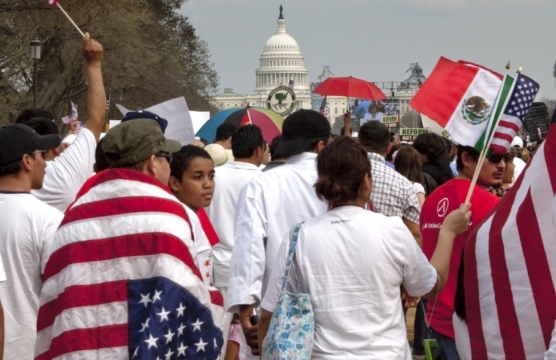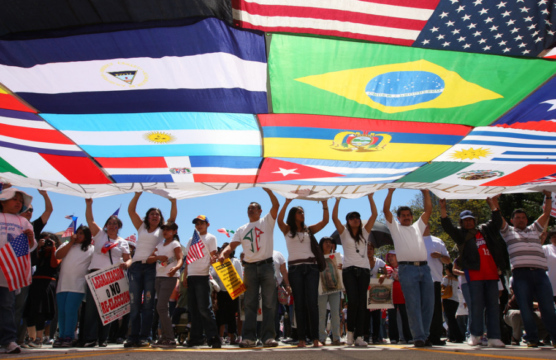A Conversation with Bill Richardson
As the global financial crisis continues to alter US relations with the hemisphere, greater engagement in the region remains critical to US interests.
On August 18th, President Obama announced a new deportation policy which would halt proceedings against unauthorized immigrants without criminal backgrounds and direct US officials to use greater discretion in pursuing deportation cases. The underlying causes and potential consequences of this new policy were the subject of a discussion hosted by the Inter-American Dialogue on September 21 with Angela Kelley, vice president for immigration policy and advocacy at the Center for American Progress, Patricia Montes, executive director of Centro Presente, and Manuel Orozco, senior associate and director of the remittances and development program at the Inter-American Dialogue.
Despite the high hopes for immigration reform that accompanied his election in 2008, President Obama has overseen some of the strictest enforcement policies of the past several decades. As Angela Kelley noted, “Obama has done in one term what Bush didn’t do in two. He has deported one million people. That is the taste in people’s mouths.” Patricia Montes added that this rigid enforcement has had widespread consequences for Latin American migrant communities, causing the separation of families and mostly affecting those who do not represent a threat to US society.
In addition to affecting migrant communities in the United States, tough enforcement policies have serious implications for immigrants’ countries of origin. Manuel Orozco described how subordinating immigration policies to security concerns has forced Latin American countries to spend the scarce resources they have on maintaining migrant reception centers instead of focusing on the relationship between migration and development. Also, this law-enforcement-only approach fails to take into consideration future migration trends more related to natural disasters, climate change, and the political vacuum emerging in some countries.
The speakers agreed that the tough enforcement stance has been the result of an adverse and highly polarized political climate. The health care debate overshadowed immigration reform early on in the Administration and strong Republican demands for increased enforcement in the House, especially under Texas congressman and Judiciary Committee chairman, Lamar Smith, has been met with virtual silence in the Democrat-controlled Senate. These political conditions and the need to appear tough on the issue forced “the administration’s foot to push heavy on the enforcement gas pedal,” remarked Kelley.
Just as enforcement policies have been driven by political calculations, so too has the recent announcement to use greater discretion in tackling deportations cases. Latino voters are the fastest growing political force in the country and will likely have a significant say in the upcoming 2012 elections. This new policy, which would develop shared criteria to prioritize the 300,000 open deportation cases and close those deemed less urgent, is seen as a move to curry favor with a Latino community increasingly identifying with the cause of undocumented migrants. “Polls show that a quarter of Latino voters know someone who has been deported or is involved in a removal procedure,” Angela Kelley commented, illustrating the broad effects enforcement policies are having on Latinos in the United States
The speakers, however, not only framed the challenges of unauthorized immigration in political and legal terms, but in a broader social and cultural context, as well. Undocumented migrants, marked by “illegal” citizenship status, are socially stigmatized, an obstacle that the immigrant rights community has not yet been able to overcome. Montes commented that her organization, Centro Presente and the umbrella movement, the National Alliance of Latin American and Caribbean Communities (NALACC) have undertaken a campaign entitled “Somos, We Are” to eradicate the use of the term “illegal,” even targeting their own communities where unauthorized migrants have often internalized a sense of marginalization.
But the speakers admitted that advocacy strategies have failed to reach Caucasian and African-Americans whose hearts and minds must be won in order to achieve a cultural shift. Kelley referred to the gains made by the gay and lesbian movement, which has largely succeeded in normalizing its position within US society by tapping into the media and pop culture. Above all, unauthorized migrants must be humanized in the eyes of the US public. “It’s about going to the middle and showing we have shared values. It’s about having storylines,” Kelley remarked.
As the global financial crisis continues to alter US relations with the hemisphere, greater engagement in the region remains critical to US interests.
Everyone recognized that the immigration system was a mess and needed to be fixed, but the politics were too polarized and complicated for any serious progress to be made.
Obama has acted decisively to push through immigration reforms but the scope of his efforts remain unclear.

